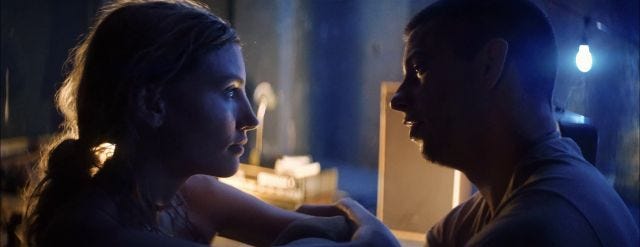The Wanting Mare
Visually arresting and full of imagination, "The Wanting Mare" takes a nigh-incomprehensible approach to the basics of storytelling.
I experienced equal parts fascination and frustration watching “The Wanting Mare.” It’s a film of extraordinary beauty and imagination, and a nigh-incomprehensible approach to the basics of storytelling.
I don’t believe writer/director/star Nicholas Ashe Bateman intended a standard linear narrative. It’s more of a dreamlike dance through wonderment and regret. The actors, almost all of them unknowns, acquit themselves with a level of authenticity and heft you don’t often see in the science fiction genre.
That’s how “Mare” is described in the press notes, though it’s more of a gritty dystopian fantasy. Set in a mythological time, possibly long after this one, it seems to consist of only two places: Whithren, a seaside hellhole in which people scrounge and scrap, and an unnamed northern place that everyone wants to get to.
The only way to escape the heat and rot of Whithren is by catching a cargo ship, which transports the wild horses caught in the south and taken north.
It’s a Casablanca-like scenario, though instead of Captain Renault’s letters of transit the only way out is a ticket aboard the ship. These aren’t things you can just buy, more like physical totems that people are willing to kill for.
Moira (Jordan Monaghan) comes from a line of women who seemingly came from the northern place, and every night they dream of how the world was before… whatever made it like it is now. With her cascading tawny hair, lithe frame and bold gaze, Moira is the picture of strength and independence.
Moira likes to go from her lonely house on the cliffs into the city to listen to music. The whole place is a thicket of buildings that have fallen down, and ones that are about to. There doesn’t appear to be any kind of industry, or trade, or agriculture. Just people killing time until they can get their hands on a ticket, or die.
(There are phones and automobiles of near-past vintage, so it’s hard to fix exactly how this world relates to our own.)
One night she saves Lawrence (Bateman), who has been shot up while attempting a robbery. As he heals, they begin a joyous love affair that is the high point of the film, carried out almost entirely without words.
Lawrence tells Moira that he knows where a ticket is, and promises to get it for her. But things go poorly, and he finds a baby girl abandoned on the shore -- much like Moira’s ancestor long ago -- and brings it to her.
The time shifts forward, inexplicably, and for a time we follow this little girl as an adult (Yasamin Keshtkar). She has somehow come into possession of one of the valuable horses, and forms an alliance with Hadeon (Edmond Cofie), a local crime lord, to keep the animal safe. Like Moira and Lawrence, they begin an affair (which the movie depicts so scantly it’s more implied).
Things go on. We meet more people, and try to puzzle out how they factor into the story. Another young woman (Maxine Muster), an older man and woman (Josh Clark and Christine Kellogg-Darrin), a few others.
How does it all fit together? I’m not entirely sure. A better question is: Was it ever meant to? Or is this film closer to surrealism, relying on imagery and mood to grant us an interesting experience?
Bateman seems to have a bright future as a filmmaker. He’s got an arresting visual style that reminds of a young Ridley Scott. Certainly he comes up with intriguing story concepts. “The Wanting Mare,” though, feels like a half-assembled puzzle that came with many pieces missing.





